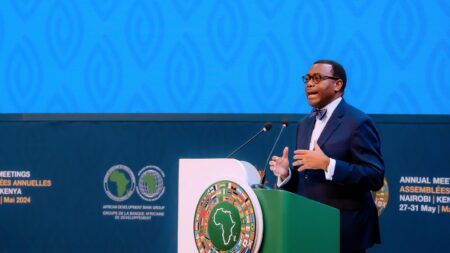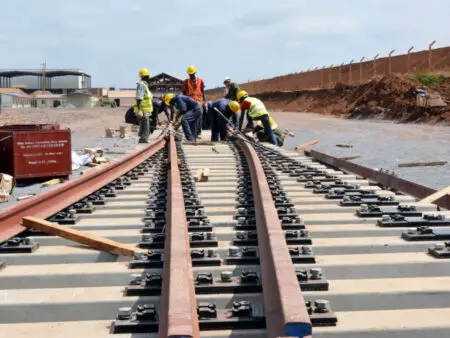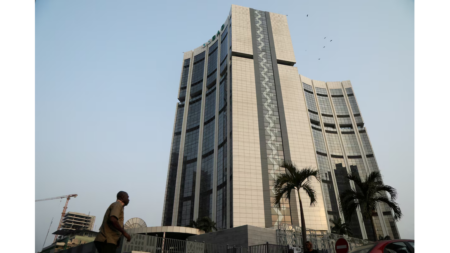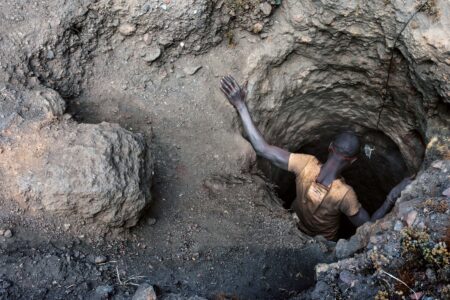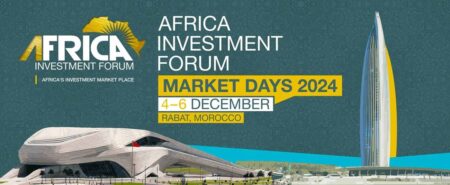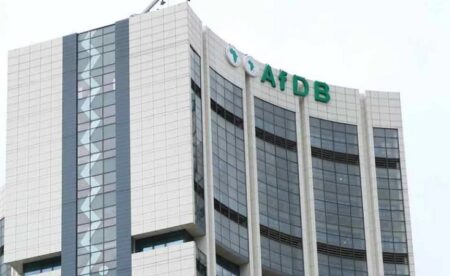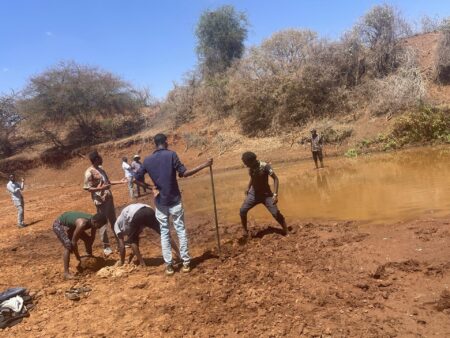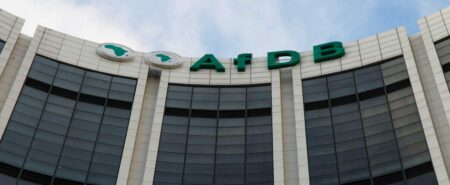- Africa’s new dawn: the rising role of digital and AI in agriculture
- Can Dangote Refinery Transform Africa Energy Ambition
- Gallup Survey: 80 per cent of Kenyan Workers Are Disengaged and Seek New Opportunities
- Madagascar Man Freed from 5KG Tumor After 15-Year Struggle
- How women in Africa are perceived and treated
- Sugar consumption in Kenya to Increase to 1.23 Million Tonnes
- Can Somalia and Turkey Oil deal Bring Change in Somaliland
- Remittances to Kenya dropped to $371.6 million in June, marking a six month low
Browsing: AfDB
- African Economic Outlook 2024 calls for an overhaul of the global financial architecture to transform African economies.
- Seventeen African economies are projected to grow by more than 5 per cent in 2024, potentially increasing to 24 by 2025.
- Growth in Southern Africa is projected to pick up slightly from an estimated 1.6 per cent in 2023 to 2.2 per cent in 2024
East Africa is projected to lead GDP growth on the continent, amidst global challenges, according to the African Development Bank Group’s African Economic Outlook 2024 report. This region is expected to see the fastest growth, with real GDP growth rising from an estimated 1.5 per cent in 2023 to 4.9 per cent in 2024 and 5.7 per cent in 2025.
However, the economic uncertainties in South Sudan and Sudan due to conflict have led to a downward revision of 0.2 percentage points for 2024 due to larger-than-expected …
- AfDB asks policymakers to put in place an orderly and predictable way of dealing with Africa’s $824Bn debt pile.
- According to AfDB, Africa’s ballooning external debt reached $824 billion in 2021.
- AfDB president says there is urgent need for increased concessional financing, particularly for low-income countries.
Africa’s immense economic potential is being undermined by non-transparent resource-backed loans that complicate debt resolution and compromise countries’ future growth, African Development Bank (AfDB) President Dr Akinwumi Adesina has said.
Adesina at the Semafor Africa Summit taking place on the sidelines of the International Monetary Fund and World Bank 2024 Spring Meetings, highlighted the challenges posed by Africa’s ballooning external debt, which reached $824 billion in 2021, with countries dedicating 65 per cent of their GDP to servicing these obligations.
He said the continent would pay $74 billion in debt service payments this year alone, a sharp increase from $17 billion in 2010. “I …
- New investment in Tanzania’s railways sector is expected to directly benefit nearly 900,000 people and indirectly impact an estimated 3.5 million.
- Tanzania operates two railway systems, totaling 3,682 km in length.
Tanzania railway sector is poised for immense growth as the World Bank poured significant funding by approving $200 million in financing from the International Development Association (IDA) which is a part of the bank.
According to available information from the World Bank statement made on Friday, the bank said the financing for the second phase of the Tanzania Intermodal and Rail Development Project (TIRP-2) will improve safety, climate resilience, and operational efficiency along this railway segment.
Read also: AfDB approves $696.4M financing for Tanzania-Burundi-DRC railway project
Tanzania railway plan anchored on Dar- Morogoro SGR
The funding comes a few weeks after Tanzania Railways Corporation (TRC) began its inaugural trial journey of the electric Standard Gauge Railway (SGR) train …
- AfDB grant aims to enhance Burundi’s productivity by four to five times and bolster agro-processing for increased domestic and export food availability.
- It also promises significant economic diversification, creating jobs, improving food security and nutrition, and strengthening regional trade.
- This investment can help safeguard the livelihoods of countless farmers against the increasing unpredictability of weather patterns due to climate change.
The African Development Bank (AfDB) has announced $80 million grant to bolster Burundi’s agricultural sector and transform the nation’s agricultural industry.
AfDB’s Director General for East Africa, Nnenna Nwabufo, revealed this financial pledge after meeting with Burundian Prime Minister Gervais Ndirakobuca in Bujumbura. This funding is poised to multiply the sector’s productivity by four to five times, with a keen focus on enhancing agro-processing capabilities to not only increase the availability of food within Burundi but also boost its export potential.
The collaboration between the AfDB and the Burundian government …
- Africa is loosing out on bad minerals for loan deals, AfDB warns.
- AfDB is developing initiatives to help countries’ address the bad loans.
- China alleged to be the leader in bad minerals for loan deals with Africa.
Africa’s natural resources are being traded for loans from international lenders and that is why the continent is underdeveloped, the Head of the African Development Bank, Dr Akinwumi Adesina, has decried.
In an interview with The Associated Press in Lagos, Nigeria, Dr Adesina called for an end to “loans given in exchange for the continent’s rich supplies of oil or critical minerals used in smartphones and electric car batteries.”
The Head of Africa’s biggest lending bank, AfDB, said some countries have gained control over mineral mining in places such as Congo and have left some African countries in financial crisis owing to such ‘mineral for loans deals.’
“They are just bad, first …
- The AfDB and partners in Rabat, Morocco, are organizing the 2024 Africa Investment Forum to catalyze investments in Africa’s agriculture, infrastructure, and renewable energy.
- The forum is a pivotal platform for advancing Africa’s economic integration, promoting policy innovation, and encouraging private-sector engagement and international collaboration.
- By aligning with sustainable development, inclusivity, and green finance goals, the Africa Investment Forum aligns with global sustainability goals, positioning Africa in the transition to a green economy and attracting ethical investments.
Set against the vibrant backdrop of Rabat, Morocco, the 2024 Africa Investment Forum Market Days, scheduled for December 4–6, is yet another cornerstone event for continental and global investors seeking growth opportunities in the continent.
The African Development Bank and seven founding partners will back this forum to drive investment-ready deals to fruition, further highlighting its critical role in Africa’s economic landscape.
Africa Investment Forum a catalyst for investment mobilisation
Since its inception …
- AfDB signs a risk facility worth over $150 million to boost financial inclusion.
- Survey shows risk-supported Commercial Banks in Africa can play a key role in poverty eradication.
- Increased access to capital loans will help lower-income families increase their household earnings
To boost intra-Africa trade in line with the aspirations of the African Continental Free Trade Area (AfCFTA), the African Development Bank Group has approved a $150 million risk facility.
The funding will be through the Trade Finance Unfunded Risk Participation Agreement, a deal which has been entered between the African Development Bank (AfDB) and the Trade & Development Bank (TDB).
Under this agreement, “the AfDB will provide guarantee cover of 50 per cent and up to 75 per cent for transactions in low-income countries and transition states on a risk share basis with TDB to a number of qualifying local and regional banks,” the bank states.
In this first …
- Borana region is home to an estimated 1.2 million people, half of whom are women.
- These communities rely heavily on pastoralism for their livelihoods, making them particularly vulnerable to the impacts of climate change.
- In March 2023, over 3.3 million livestock perished due to lack of water, leaving more than 67,000 households without means of economic support.
For decades, millions of people in Ethiopia’s Borana region have borne the brunt of the loss of livelihoods as climate change-induced disasters cause the death of their livestock, leaving them vulnerable to economic difficulties.
This story is, however, set to change following the African Development Fund’s $46.02 million grant to the Borana region to improve water access and sanitation in the area.
This funding, designated for Phase 2 of the Borana Resilient Water Development for Improved Livelihoods Program, is a vital investment in the well-being and future of the region’s pastoral communities.…
- With 65% of the global uncultivated arable land located in Africa, AfDB says there is potential for the continent to feed itself and the rest of the world.
- The lender is now committing to focus on securing long-term financing for research activities and enhancing researcher CGIAR’s effectiveness across the continent.
- AfDB and CGIAR also anticipate engaging in capacity building for country-based national agricultural research services partners, young scientists, extension workers, and private-sector seed growers to produce certified seeds.
The African Development Bank Group (AfDB) and the Consortium of International Agricultural Research Centres (CGIAR) have committed to enhancing food security through improved production to offer better nutrition for Africa’s growing population.
This commitment involves strengthened collaboration between the parties, leveraging the robust arable land the continent possesses. “With 65 percent of the global uncultivated arable land, we believe that the continent can feed itself and the rest of the world,” AfDB …
- The AfDB’s mandate for a three-year social bond was announced on Wednesday, 17th January 2024.
- This issuance is a significant highlight amid a dynamic week in the USD SSA markets, witnessing the launch of eight benchmarks totaling US$17.25 billion within a span of two days.
- This new three-year Social Benchmark is the Bank’s first global benchmark of the year.
The African Development Bank has issued its first ever three-year social bond targeting to raise US$2 billion under its recently established Sustainable Bond Framework, which was launched in September 2023.
Set to mature on February 25, 2027, the Sustainable Bond Program seamlessly integrates and strengthens the African Development Bank’s existing Green and Social Bond initiatives, streamlining the issuance of green bonds, social bonds, and sustainability bonds.
This new three-year Social Benchmark is the Bank’s first global benchmark of the year, strategically aligning with the robust reopening of primary markets in January …





